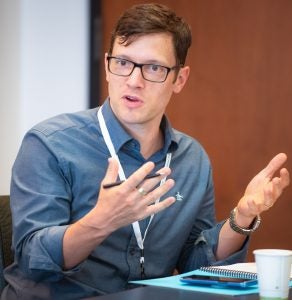 Corbin Hiar inherited his respect for conservation and sustainability from his paternal grandparents. “My grandparents grew up in the depression in North Dakota and they struggled a lot,” says Corbin, an alumnus of Metcalf Institute’s 2019 Annual Science Immersion Workshop for Journalists. “There was definitely an ethos they instilled in me to not waste anything.”
Corbin Hiar inherited his respect for conservation and sustainability from his paternal grandparents. “My grandparents grew up in the depression in North Dakota and they struggled a lot,” says Corbin, an alumnus of Metcalf Institute’s 2019 Annual Science Immersion Workshop for Journalists. “There was definitely an ethos they instilled in me to not waste anything.”
That ethos would eventually fuel a passion for reporting on environmental issues.
Hiar, who earned a Bachelor’s degree in environmental studies and international relations from Bowdoin College, began his journalism career as an intern for The Nation. He went on to report for Mother Jones, The New Republic, The Huffington Post, the Center for Public Integrity and The Economist before. Now he reports for E & E News, where he has covered Federal agencies and public health, and now focuses on business and climate change.
In his application for a Metcalf fellowship, he wrote, “one of the biggest challenges I face on my beat is to make sense of the scientific literature and the various interest groups fighting over it…The Metcalf science workshop could help me to both write about public health with more confidence and spot stories lurking in the scientific or regulatory literature that I’m currently missing.”
Hiar credits his Metcalf experience with leading him to a project about the impact of refineries on residential neighborhoods. “One of the speakers on the last day of the workshop, Ricardo Sandoval-Palos, a former colleague of mine, said some interesting things about looking at local communities, health impacts of refineries, and trying to find the data underlying it,” recalls Hiar.
“I was intrigued,” he said. “And it just so happened that we were both taking the train from Rhode Island back to Washington, D.C., where we both lived.” That conversation planted the seed for Toxic Zones, a project highlighting the health impacts on communities living near refineries.
Hiar continues to work on the series in collaboration with NBC News Investigates and the Investigative Reporting Workshop. One story in particular focuses on residents in a Philadelphia community exposed to potentially dangerous levels of the chemical benzene following an explosion at a nearby refinery. “Officials gave no formal notice to residents that the same facility had registered among the highest benzene levels of any refinery in the country,” wrote Hiar, citing EPA data.
As Hiar looks back on the training he received at Metcalf’s Workshop, his favorite activity was the opportunity to engage with scientists in a non-deadline setting “and just talk about the work that they do, the issues and environmental challenges that we’re covering, and to get their perspectives.”
He also valued the support he and the other journalists felt during the workshop, especially in an age where the news media feels under attack. “To hear people tell us again and again that what we do is valuable, that they want to help us do it better, was pretty amazing and unexpected,” he says.
read more alumni profiles